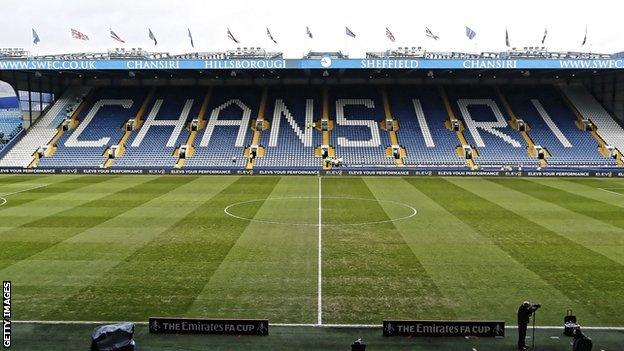Sheffield Wednesday: EFL charge Owls with misconduct following Hillsborough sale
- Published

Dejphon Chansiri bought Sheffield Wednesday in 2015
Sheffield Wednesday have been charged with misconduct by the English Football League after selling their Hillsborough stadium to owner Dejphon Chansiri to try to avoid breaking spending rules.
The Owls sold their ground for about £60m, helping them record a pre-tax profit of £2.5m for 2017-18.
The charges relate to "how and when" it was sold and its inclusion in the 2018 accounts when it was sold a year later.
Championship side Wednesday say they will "vigorously defend" the charges.
After a reviewing a "large number of documents" relating to the sale, the EFL said there was "sufficient evidence to justify issuing" the charges, which are to be considered by an independent disciplinary commission.
If found guilty, Wednesday face "any sanction" under EFL regulation 92.2, which range from a reprimand to a points deduction, financial penalty or possible expulsion from the league.
Why sell the stadium to club's owner?
Without the sale of the ground, Wednesday would have posted a pre-tax loss of £35.4m for the financial year covering the 2017-18 campaign.
That loss would have followed on from deficits of £9.8m and £20.8m in the previous two seasons.
Under the EFL's profitability and sustainability rules (previously known as financial fair play), Championship clubs are only allowed to lose £39m over three years.
So to avoid a heavy points deduction (for which the maximum penalty is 21) a substantial amount of money needed to be generated.
The Owls were not the first to sell their stadium in an effort to make a profit in recent seasons, Derby County, Aston Villa and Reading having also been scrutinised for similar transactions.
Recent history of financial stress for Owls
Wednesday owner Chansiri, who bought the club in 2015, said he was putting the club up for sale in December 2018. He admitted at the time that the club broke spending rules by "eight figures".
They spent the summer of 2018 under a transfer embargo and Chansiri warned that he expected to face a similar sanction in March if "problems" could not be "solved" by the time they submitted their accounts.
Last season, Birmingham City were deducted nine points by the EFL for breaching profitability and sustainability rules.
'Timing of sale would be cause for concern' - Analysis
Football finance expert Kieran Maguire, speaking to BBC Radio Sheffield
By itself, what Sheffield Wednesday have done is not actually a problem - it is compliant with EFL rules.
First of all, the timing of the sale appears curious. Sheffield Wednesday's accounts were until 31 July 2018 and there was no reference of ownership by the new company until around 12 months later with the land registry.
The timing issue does concern the EFL. They might be concerned that the transaction was accelerated into the 2018 accounts, which would give them cause for concern.
The next unusual thing was that normally, if you sell a property, you get the proceeds from the buyer straight away but, according to Wednesday's accounts, it's going to take a period of eight years for the full payment to be made.
The one final issue is the valuation of the stadium itself. Given that Reading sold their stadium for £27m and West Ham sold theirs for £40m, it does seem unusual for Sheffield Wednesday's stadium to be sold for £60m. The geographical location would suggest that it's not in a property area which is significantly higher than London or the home counties.
Wednesday will have to simply provide evidence that the transaction was undertaken at arm's length, at market prices, with a report by a surveyor and also evidence that the transaction had gone through - in the form perhaps of stamp duty being paid at the initial date of the transaction.
Provided they can generate that evidence then I think they would be able to mount a strong defence.